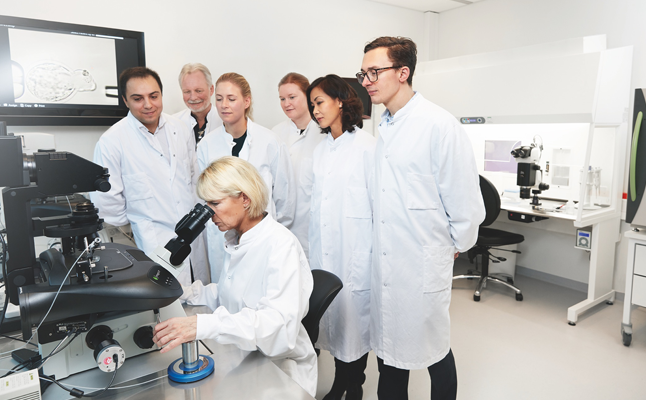WHO recognizes infertility as a disease – why that matters and what it means for patients

How education and training focused on data utilization can improve fertility outcomes
By Professor Christopher Barratt
Head of Reproductive Medicine Group at the University of Dundee
Male and female infertility is on the rise around the world due to various factors. To ensure that every person has access to quality treatment, World Health Organization (WHO) has put infertility on its agenda as a global public health issue, working to help support standardization across the reproductive health industry. We spoke with Professor Barratt, an active member in WHO, about the importance of education and why WHO has decided to play a key role in creating standards.
Professor Christopher Barratt is Head of the Reproductive Medicine Group at the University of Dundee and an active member of the WHO. His belief is that education for patients, clinicians and practitioners is the way forward and is significantly invested in creating knowledge and awareness around infertility, especially within his focus area of male reproductive health.
What role does education play in the fertility industry?
There is a huge amount of disinformation out there about infertility. This makes it difficult for patients to get the quality information they need to make the best treatment decisions. Poor decisions lead to overtreatment, inefficient treatment and lots of wasted time and money. If we are to grow the discipline of reproductive health, we need to create standards and educate the industry and patients alike.

“Recognizing infertility as a disease was an important step in the progress of infertility care and the first step to standardization and education.”
Why is it important for WHO to recognize infertility as a disease?
Recognizing infertility as a disease was an important step in the progress of fertility care and the first step to standardization and education. The message has not yet been universally transmitted – that takes time – and the public doesn’t necessarily think of infertility as a disease. That means they often aren’t aware of solutions or that they qualify for treatment. Having infertility recognized as a disease is also a key tenant to any sort of political or government-backed measures to support fertility care. This will be important for expanding access to treatment.
You’re on the editorial board of WHO’s new Semen Analysis manual. What is the purpose of this manual?
The purpose is to create standards around semen testing. At the moment, there is no standardization on this. One clinic does semen analysis one way and the clinic down the road will have their own method. For the WHO Semen Analysis manual, we’ve worked hard to make it very simple and very clear what should be done as a basic assessment and hopefully that will help increase standardization.
“For the WHO Semen Analysis manual, we’ve worked hard to make it very simple and very clear what should be done as a basic assessment and hopefully that will help increase standardization.”

Why is the standardization of semen analysis important for infertility treatment?
The semen parameters define the treatment for the patient. Whether the patient is recommended IVF, ICSI, artificial insemination with a partner or donor insemination depends on the results of the semen analysis. You need quality semen analysis data to make a correct diagnosis. Bad data leads to poor treatment suggestions on a clinical level and that can ultimately impact outcomes.
What can be done to improve the quality of data across the discipline?
We discuss the lack of quality data a lot in the field and how we can change it. There was an assumption that there is a bias against male reproductive health and that was why we weren’t getting the funding to run experiments. But then we investigated the average grants given to male versus female reproductive studies and found that the amount of funding awarded globally was fairly equal. So, we determined that there is no bias against the discipline, but that we aren’t submitting enough high-quality proposals to get that funding. We need to change this by working together to produce impactful proposals. This is a mindset shift – we need to solve the problem together instead of competing against each other. Today, that’s the only way to make real progress, clinically, socially and politically.
“Bad data leads to poor treatment suggestions on a clinical level and that can ultimately impact outcomes.”
How can reproductive healthcare move up the political agenda?
At the moment, the common wisdom is that there are enough people in the world, we don’t need more mouths to feed, the planet can’t support more people, and so on. That mindset is changing, but it’s not changing fast enough to have enlightenment in many countries. There is a lot of data available about falling fertility rates. Those declines have substantial economic and social consequences for a country and immigration is not always the answer. So, we must put families at the center of the argument, building families, supporting families and healthcare for families. In reproductive health, we should be making substantial arguments in this arena.

“So, we must put families at the center of the argument, building families, supporting families and healthcare for families.”
How do you balance those political, philosophical and social discussions on a global level?
The first thing you need to do is get the data that truly reflects what’s going on. WHO, the UN and other organizations are playing a key role in creating and gathering data. Although they show that the trends with fertility rates are clear, the data alone is not enough. So, the next thing you need to do is attack the economic argument: this is how you convince policymakers that this is an important issue. You need headline figures that show what can happen to the economy unless something is done soon. But this will also only get you so far because policymakers are inundated with economic arguments. What they need to see is solutions, As a discipline, we need to provide solutions, backed by economic arguments grounded in data to be able to move the ball forward on fertility care.
“I’m optimistic that through education, better data and standardization, we may be at the dawn of a new era in reproductive health.”
What’s your outlook for the future of fertility care?
Reproductive health is a relatively new field and the links between the industry and academia are generally very interactive – and that’s quite unique. The other advantage we have is that reproductive health is newsworthy. The public has a great interest in babies, families and reproductive medicine. That means that across the discipline, we can all play a strong role in educating the public. Although progress has been slow and fragmented over the last 40 years since I have been in the field, I’m optimistic that through education, better data and standardization, we may be at the dawn of a new era in reproductive health.

 My Clinic is in the United States
My Clinic is in the United States My Clinic is in Canada
My Clinic is in Canada

